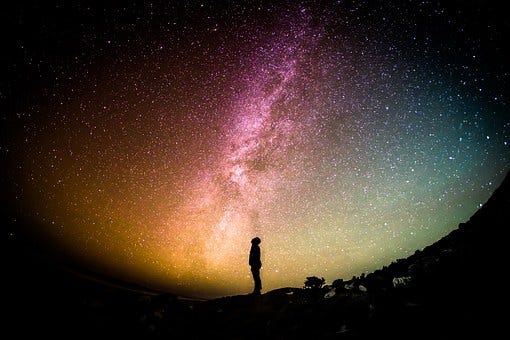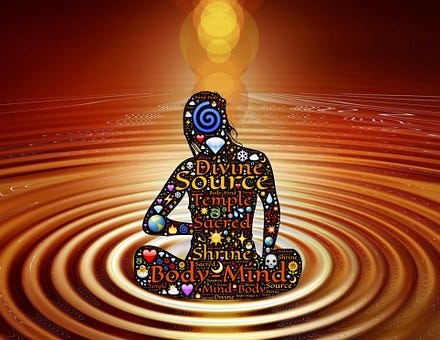
Jonah Sachs: “We live in a world that has lost its connection to its traditional myths, and we are now trying to find new ones — we’re people, and that’s what people without myths do. These myths will shape our future, how we live, what we do… The ability to dream up and spread these solutions lives or dies on the ability to tell great stories that inspire people to think differently. Nothing is more urgent than that right now”¹.
Edward Edinger: “A human society cannot long survive unless its members are psychologically contained within a central living myth. Such a myth provides the individual with a reason for being…
“Western society no longer has a viable, functioning myth. Indeed, all the major world cultures are approaching, to a greater or lesser extent, the state of mythlessness… Meaning is lost…
“Nothing less than the discovery of a new central myth will solve the problem for the individual and for society”².
====================================================================================================
This article is the latest in a series on the theme of whether we can find a new mythology, a common visionary story, to unite humanity in an attempt to solve the world’s problems. We need this because the planet is in crisis, and it is not clear whether the current political systems and leaders are capable of providing solutions. (For a guide to the whole series, see under Mythology on the Blog Index page. )
I believe that the root of the problem is that modern society has lost its way, is in a spiritual vacuum, secularism having become the norm in politics. We have been led astray by the philosophical and scientific movement known as the Enlightenment which has erroneously rejected ancient, traditional ways of thinking, the great religions and myths of the past. As Steven Pinker, one of the Enlightenment’s current main spokesmen, sums up: “The findings of science entail that the belief systems of all the world’s traditional religions and cultures…are factually mistaken”³. The worldview of atheistic materialism is on the rise, promoted aggressively, most obviously by Richard Dawkins, with the support of many others.
As this new article has reached a turning point in the series, here is a brief summary of what has preceded. Earlier articles have discussed the function and nature of mythology, how myths originate, and the attempts by various modern Enlightenment scientists to construct their own mythology to replace that of the ancients, which they reject. I have argued strongly that these attempts are unsuccessful and unhelpful, simply wrong.
So we have reached the point where we need to search for this new unifying story, this new mythology. There is a passage in Keiron Le Grice’s book The Archetypal Cosmos⁴ which describes the current situation very well: “When old beliefs no longer adequately explain the actual facts of our life experience, when a myth becomes out of touch with the reality of daily lives of the people of a culture… so conflict arises between personal experience and collective mythology as people struggle to accept the validity of the story they are presented with and to accept, consequently, the associated values of the culture. Then the discrepancy between professed beliefs and the lived reality of human life gives rise to what psychologist Leon Festinger has termed cognitive dissonance, an acute psychological discomfort arising from an irreconcilable contradiction between our actual experiences and our understanding of how the world is supposed to be. Yet it is out of such psychological conflict and innate tension that new visions, new world views, and new myths are born… We stand in need of a new response to the unique spiritual challenge of our time. We need a new mythic perspective” (p33).
There was a time when this would have referred to the Enlightenment thinkers who thought that old religions were in conflict with the new findings of science. Now the boot is on the other foot, and the time is fast approaching when the worldview of Enlightenment science (how we are told the world is supposed to be) is irreconcilably contradicted by the actual experiences of many people around the world, who therefore adopt a spiritual viewpoint. At the same time, many people remain converted to Enlightenment thinking, and have not yet thought deeply enough, or had experiences which would convince them otherwise.
 If there is going to be a new mythology, we have to ask how it will originate. In ancient times myths seemed to emerge spontaneously from the collective psyche, in the manner of dreams, thus were not created consciously by humans. (Joseph Campbell said: “Myths are public dreams, dreams are private myths”.) It is possible, indeed likely, that this age has now long passed, never to return. We can, however, live in hope; Le Grice is optimistic: “As we leave behind the old mythic and religious forms, our time is now pregnant with the possibility that a totally new form of myth might emerge. The history of religion has demonstrated the remarkable resourcefulness of the human psyche, for new religions and new myths have sprung forth from the fertile ground of the collective imagination just at the time they were most needed” (p33). If that age has passed, however, then any new mythology would have to be fashioned by humans themselves. There is nothing wrong with this in principle but, almost by definition, this would not be mythology in the original sense.
If there is going to be a new mythology, we have to ask how it will originate. In ancient times myths seemed to emerge spontaneously from the collective psyche, in the manner of dreams, thus were not created consciously by humans. (Joseph Campbell said: “Myths are public dreams, dreams are private myths”.) It is possible, indeed likely, that this age has now long passed, never to return. We can, however, live in hope; Le Grice is optimistic: “As we leave behind the old mythic and religious forms, our time is now pregnant with the possibility that a totally new form of myth might emerge. The history of religion has demonstrated the remarkable resourcefulness of the human psyche, for new religions and new myths have sprung forth from the fertile ground of the collective imagination just at the time they were most needed” (p33). If that age has passed, however, then any new mythology would have to be fashioned by humans themselves. There is nothing wrong with this in principle but, almost by definition, this would not be mythology in the original sense.
If a new mythology does not present itself spontaneously, we can attempt to move towards a new worldview, a new philosophy, which can then inspire artists, poets, novelists, and perhaps others to give expression to any emerging ideas.
Seemingly everyone recognises the power of stories to captivate and influence people, whether or not they are the unifying stories I am discussing. There are those who openly call for a new mythology: Joseph Campbell, depth psychologists like Carl Jung and his followers, notably Edward Edinger, the scientists that I have discussed (Steven Pinker, David Christian, Julian Huxley, Ursula Goodenough), environmentalist Alex Evans⁵, and Keiron Le Grice as in the above quotes. Others use mythological themes in their works, and their immense success is a testament to the power of such stories: novelists like J. K. Rowling, and film-makers like George Lucas — it is well known that Star Wars was heavily influenced by Joseph Campbell, and we now have a massive Star Wars cult. There is also Tolkien’s Lord of the Rings trilogy as novels and films.
And then we have advertising agencies. It is obvious that they tell stories in order to influence the population’s buying habits. It should not come as a surprise to anyone that sometimes the stories they tell are, to put it mildly, not 100% true, and are closer to propaganda. Some of their methods have been revealed by Jonah Sachs, a marketing man himself, in his excellent book Winning the Story Wars¹. He is also calling for a new mythology — see the quote at the beginning of this article.
Since it is easy to influence people by the power of stories, when creating a new mythology it is vital that we tell true stories, because false stories unfortunately seem to have the same power. We live in an era of propaganda and ‘fake news’, made much more available to public participation by the advent of the internet. We should not be surprised that advertising agencies, politicians, and the media indulge in such activities. It is not quite so obvious, and therefore needs to be stressed more, that scientists are just as capable of telling false stories in order to influence people, to promote their own agendas.
Our new mythology would therefore have to emerge from a true understanding of the nature of the universe — cosmological, scientific, religious and spiritual truth. From my perception, this would be a synthesis of the spiritual wisdom of ancient peoples, their mythologies and religions — sometimes called the Perennial Philosophy — and the best of modern science, inspired by quantum physics, what is often called the new paradigm. This would therefore be a reunification of science and religion, which separated at the time of the Enlightenment. I’ve identified four ingredients of the new mythology: science and cosmology, religion and spirituality, psychology, and old myths which are still relevant. I’ll discuss those in more detail in further articles.
Click here for the next article in the series.
===================================================================================================
Footnotes:
1. Winning the Story Wars, Harvard Business Review Press, 2012, p6–7
2. The Creation of Consciousness, Inner City Books, 1984, p9, p11
3. “Science is Not Your Enemy”, The New Republic, August 19th 2013, p33
4. Floris Books, 2010
5. The Myth Gap, Eden Project Books, 2017